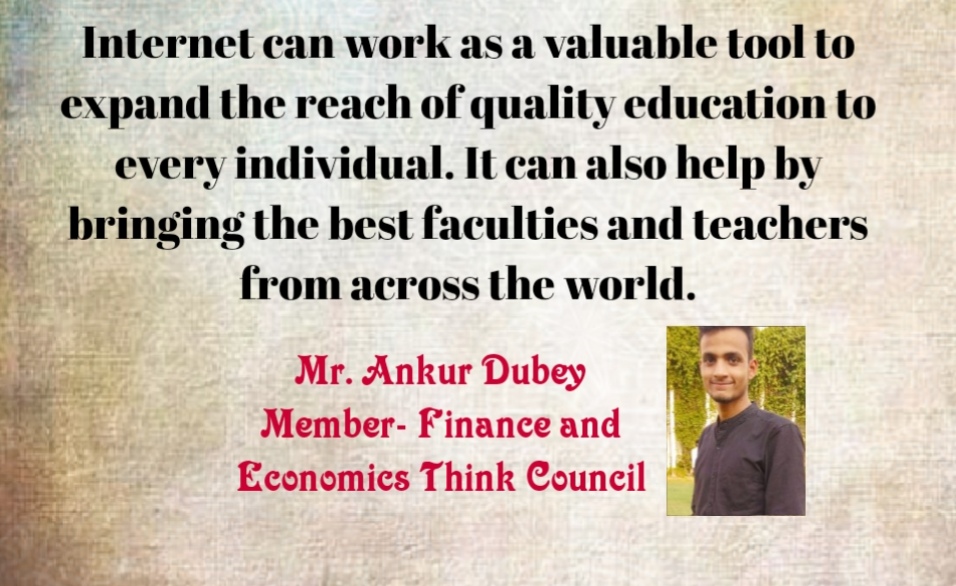“Education is the basic right of every individual”. Due to the pandemic we are forced to think about its applicability. Is it only the right of the privileged section? Is it right to force one to choose between food and school?
In November 2019, almost two years ago, a virus outbreak took place in Wuhan city of China. The covid-19 virus has since affected millions of people around the world. No one knew that this would aggravate the situation like this and push the world into a bleak future.
Today, every sector is worried about their own losses. Economists are talking about the economy, Businessmen are talking about their investments and business while politicians are trying to score points, claiming that they have taken the best possible steps and the situation is under control.
However, no one is talking about the education sector and losses that the students are facing, the cognitive skill, consistency, the pace they are losing.
All the other sectors have more or less found their pace and are recovering.
It is claimed by the government that the students are studying through online platforms. This cannot be denied, however there are certain issues that needs to be considered, like poor connectivity in rural India, lack of finances to afford mobile/laptops and internet connection for classes.
The pandemic has also resulted in many exams getting postponed and canceled. The results are prepared based on the past performance of the students, depriving them of a chance of actually improving and testing their learning.
According to the report by the world bank, it was almost seven years after the internet was first thrown open to the public that more than 1% of India’s population used the internet. It took another nine years for this figure to cross 10%. In the next six years this population grew by 24% – from 10% in 2011 to 34% in 2017. Another data from the Telecom Regulatory Authority of India shows that the internet has penetrated even deeper into society after 2017. By the end of 2019, there were about 54 internet subscribers per 100 people. This does not necessarily mean that 54% of Indians use the internet because one person can be using more than one internet connection. In absolute terms, there were 719 million internet subscribers in India by the end of 2019. As of January 2021, approximately 45% of India’s population uses internet.
Internet can work as a valuable tool to expand the reach of quality education to every individual. It can also help by bringing the best faculties and teachers from across the world. However, this needs proper implementation and active participation of faculties.
The Central Board of Secondary Education (CBSE) has initiated a survey to understand the impact of the Covid-19 pandemic on teaching, learning, and assessment processes, and the socio-economic conditions of its affiliated schools across the country. The virtual survey, which started on June 2 and concluded on June 20, focuses on the teaching and learning practices adopted by the schools during the lockdown. In a letter to all its affiliated schools on Wednesday, CBSE director of academics Joseph Emmanuel said, “The insights obtained will help the board to propose and create support systems for schools in the current academic session and future policy formulations.” This type of initiative should be taken by our government to resolve the hurdles of our online education system.
The pandemic has increased the gap between the rich and the poor, the underprivileged communities are loosing every day, we cannot let them loose their chance at a better future. Education should be compulsory and free for all, irrespective of their economic and social background, the underpriviledged should not have to choose between their basic necessities and the education of their children. The Government must take proper step to overcome this crisis. It should make a care fund and allot money & appeal to the common populace to contribute to this fund through which the government can provide the mobile phones through a fair set of channels to the needy ones.
It should also ensure a proper internet connectivity in rural areas.
When the pandemic started our institutes and even our government were not prepared for the sudden change, it has been almost 2 years and we still don’t have proper tools for online classes. Its High time, those in power must pay attention to the state of education in our country.


Well, articulated article dear. You have hinted about the digital divide meaning very sharply and in layman language. Covid19 pandemic affects all the realms of the economy. Moreover, the education sector affected more. Only Internet connectivity and online tools are not going to ease the education realm, several factors affect the education system. Metro cities or urban areas having a proper setup to ease their way of gaining knowledge, but the students were not interested in learning. Only the government will not be sufficient to make alterations in the mode of learning, there should be inclusive efforts all the participating Indians to improve and strategies the ease of learning. Thank you for sharing your knowledge in the form article. Best wishes for your future endeavours.